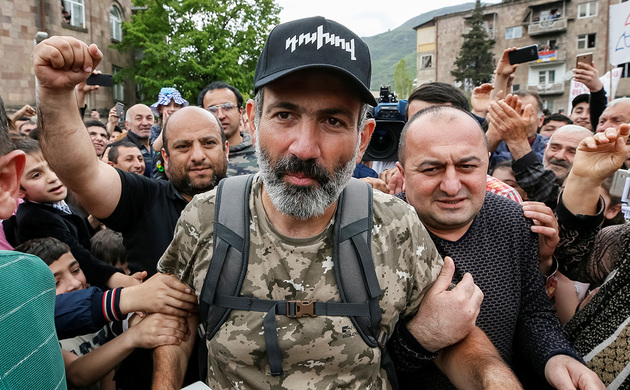France 24 reports in its article Armenia PM Pashinyan: from protest hero to war 'traitor' that Nikol Pashinyan swept to power with a promise of change, spearheading a wave of peaceful protests in 2018, but six weeks of fighting over the breakaway region of Nagorno-Karabakh appear to have reshaped Pashinyan's reputation as a reformer.
The 45-year-old former newspaper editor Nikol Pashinyan was propelled to power after he channelled widespread desire for change into a broad protest movement against corrupt post-Soviet elites. Two years ago crowds of villagers greeted Pashinyan as a hero, offering him fresh bread and berries. He walked hundreds of kilometres across the country, slept in the open, clambered onto the roofs of garages and stood on benches to deliver speeches. Weeks of mass popular protests forced veteran leader Serzh Sargsyan to resign after a decade in power and Pashinyan was elected prime minister in May 2018. He launched an anti-corruption crusade, initiated sweeping economic reforms and sidelined corrupt oligarchs and monopolies.
Pashinyan was born in 1975 in the small resort town of Ijevan in northern Armenia. He studied journalism at Yerevan State University but was expelled in 1995. He worked as a reporter and newspaper editor before getting involved in politics. Pashinyan was previously best known for his role in the unrest following the 2008 presidential vote that first brought Sarkisian to power, when 10 people died in clashes between police and supporters of the defeated opposition candidate. Authorities at the time accused Pashinyan of seeking to seize power and provoking mass riots, claims he denied. He went into hiding but surrendered in 2009. He was released from jail in 2011 under a prisoner amnesty scheme and elected to parliament the next year. In April 2018, Pashinyan brought tens of thousands of people onto the streets, forcing Sargsyan's resignation.
The conflict erupted again on September 27 in fierce fighting that sparked allegations of war crimes and left more than 1,400 dead although the real death toll is believed to be much higher. A polished politician with a soft handshake and a bashful smile, Pashinyan transformed himself into a tough-talking commander-in-chief. He regularly addressed the nation on television with impassioned war cries, calling on Armenians to "unite and break the enemy's backbone" and saying there can be no diplomatic solution to the conflict.
But after the Armenians suffered a series of setbacks on the battlefield and lost the strategic town of Shusha, Pashinyan agreed to a Russia-brokered ceasefire he described as "unspeakably painful for me personally and for our people". The accord, which will see the two sides hold on to areas under their control, sparked fury in the capital Yerevan. Protesters stormed parliament and government headquarters demanding Pashinyan's resignation. "I don't see how Pashinyan survives this," tweeted Armenian analyst Artyom Tonoyan. By contrast to his surprise rise to power in 2018, protesters now "want his head on a pike," Tonoyan added.






